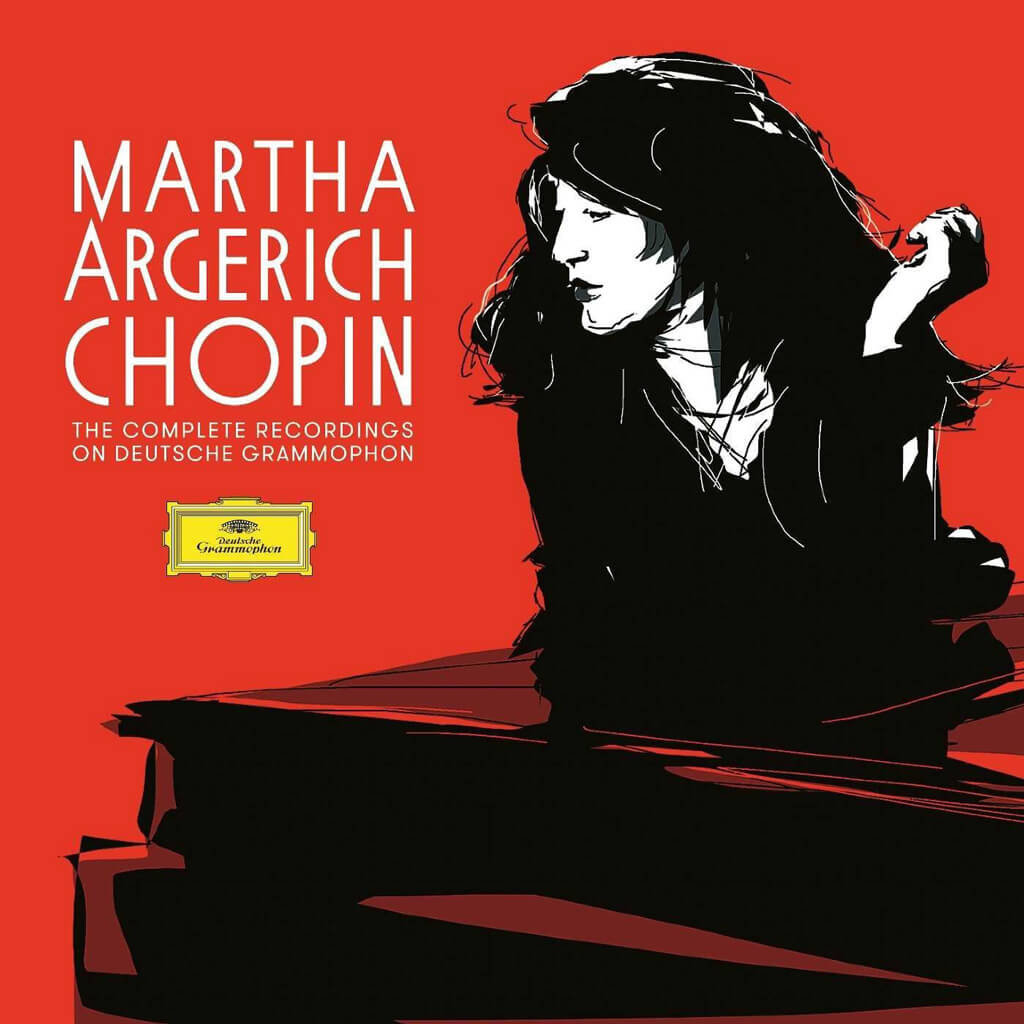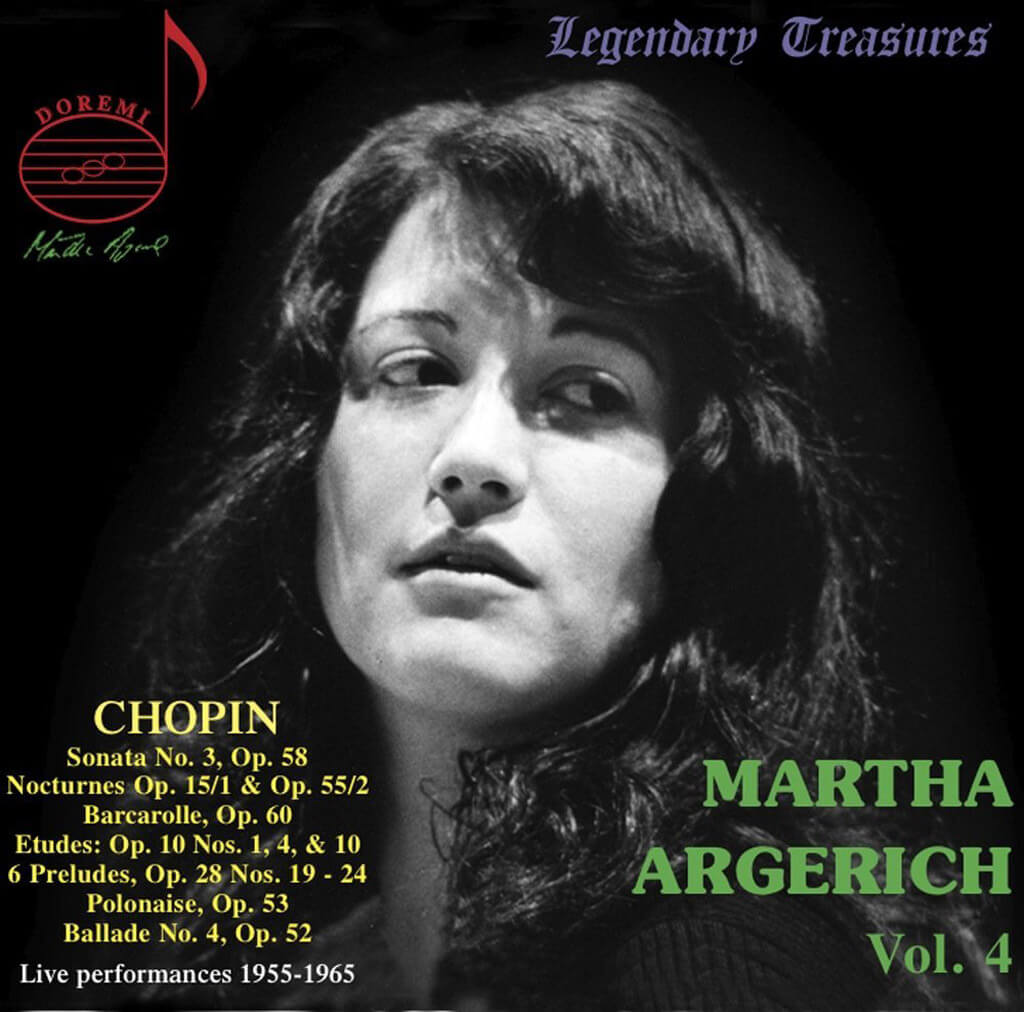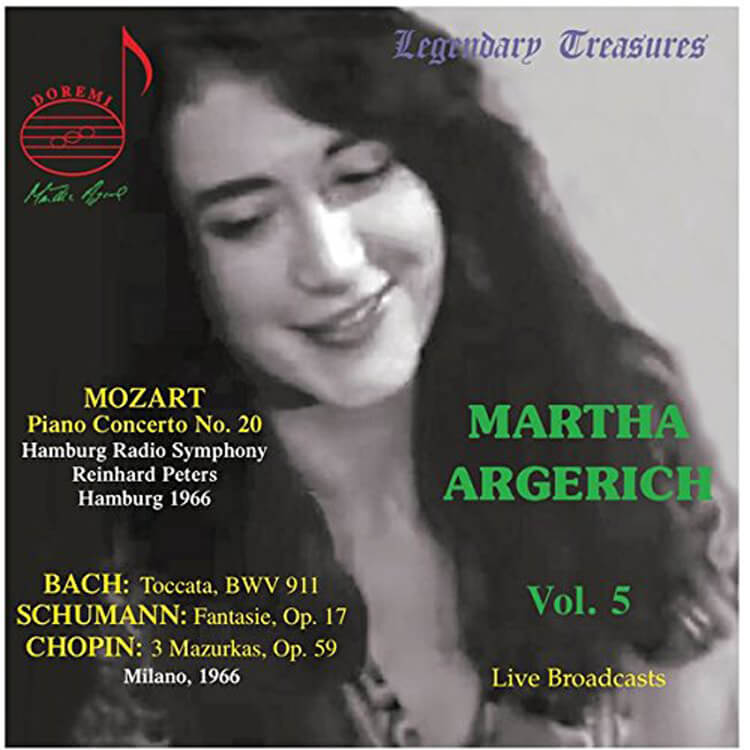Martha Argerich has been presenting her own festival — Progetto Martha Argerich — in Lugano, Switzerland, for sixteen years. Earlier this year, her announcement that 2016 would be the festival’s last season came as a great disappointment to her legions of fans who treasured this annual chamber music event in which they could hear her regularly perform with some of the world’s greatest musicians and the talented youngsters she chose to showcase. Fortunately, although her festival is finished, Argerich herself will continue to tour as a concerto soloist and chamber music player — she stopped giving recitals in the 1980s — and recordings from her glorious past performances will continue to flow into the musical marketplace.
Argerich took the music world by storm in 1965 when, at the age of 24, she won the International Chopin Competition. But even before that, she had signed a contract with Deutsche Grammophon.
This new DG boxed set brings together all the Chopin recordings she made with the Yellow Label from 1960 through 2000. There are five CDs in this boxed set, and they cover a wide range of repertoire, including the 24 Preludes Op. 28, the two piano concertos, the Piano Sonatas Nos. 2 and 3, and various shorter works. But let me be clear about this: this is a collection of Chopin works played by Argerich, not the complete works of Chopin; in fact, there are some Chopin pieces that Argerich has neither played publicly nor recorded.
The first CD contains a performance (1974) of the Sonata No. 2, with one of the fiercest first movements one could hope to hear. The Scherzo No. 2 is even more spectacular in its virtuosity. But the performance (1967) of the third movement of the Sonata No. 3 shows that the young Argerich was incomparable in controlling soft dynamics and a deceptively simple melodic line.
The performance of Chopin’s Piano Concerto No. 1 (1968) with Abbado and the London Symphony is technically superb but also memorable for its beautiful phrasing, from both soloist and orchestra. And has anyone before or since played the opening theme of the last movement with such unbridled playfulness?

The DG set includes two performances of both the Introduction and Polonaise brillante Op. 3 and the Sonata Op. 65, both for cello and piano. The 1980 versions with Rostropovich are splendid examples of two great artists at the top of their form, beautifully recorded. The versions from 2000 were recorded live in Kyoto, Japan with Argerich’s long-time friend and colleague Mischa Maisky — more subtle renditions perhaps, but performances that suffer from recording balances favouring the piano.
The 24 Préludes Op. 28 are a formidable challenge for any pianist, requiring as they do advanced technical skills as well as a supreme command of phrasing and coloration. Argerich recorded Op. 28 complete in 1977 and the performances are among the best committed to disc. That said, my favourite recording remains the Sokolov (Salzburg, 2008; DG 479 4342) for its poetry and infinite variety of tone colour.
CD 5 is devoted entirely to broadcast recordings made between 1959 and 1967.
DG has also released a 2 CD set titled Martha Argerich: Early Recordings (DG 479 3978) with recordings of solo pieces by Mozart, Ravel and Prokofiev made in 1960.

Meanwhile, DOREMI has been continuing its Argerich celebration with five volumes released so far and more to come. Volume 4 is all-Chopin and features performances recorded at the 1965 Chopin Competition. These are performances of obvious historical importance, even if the recording quality is not quite as good as later versions of the same pieces Argerich made in the studio for DG. This same volume also includes an Argerich performance of almost superhuman virtuosity of Chopin’s Etude in C major Op. 10 No. 1, recorded in Buenos Aires in 1955 when she was 14 years old!

Volume 5 of DOREMI’s Argerich series contains performances of Chopin’s Mazurkas Op. 59, recorded live in Milan on March 14, 1966, pieces she recorded in Munich for DG less than 10 months later. Although there is not much to choose between these performances, the live version serves as a reminder that Argerich was nearly always just as note-perfect in concert as she was in the studio. This album also includes a wonderful performance of Mozart’s Piano Concerto No. 20 K. 466, recorded live in Hamburg in 1966 with Reinhard Peters conducting the NDR Symphony Orchestra. Apart from the excessively heavy bass sound in the orchestra, this is fine Mozart playing, with Argerich at her sparkling best and giving full measure to the minor key emotion of the music, especially in the Beethoven cadenzas. Argerich and Abbado got together again to record this concerto with Orchestra Mozart (DG ) in 2013. While Abbado, by this time, was buying into the latest in historically informed performance practice, Argerich’s approach was pretty much the same — wonderfully old-fashioned, if you will — in both performances.
#LUDWIGVAN
Want more updates on Toronto-centric classical music news and review before anyone else finds out? Get our exclusive newsletter here and follow us on Facebook for all the latest.
- SCRUTINY | TSO Lets Berlioz Do The Talking In Season Opener - September 21, 2018
- RECORD KEEPING | Even Yannick Nézet-Séguin Can’t Make Us Love Mozart’s La Clemenza di Tito - September 6, 2018
- RECORD KEEPING | Giovanna d’Arco With Anna Netrebko Explains Why The Best Operas Survive - August 30, 2018



